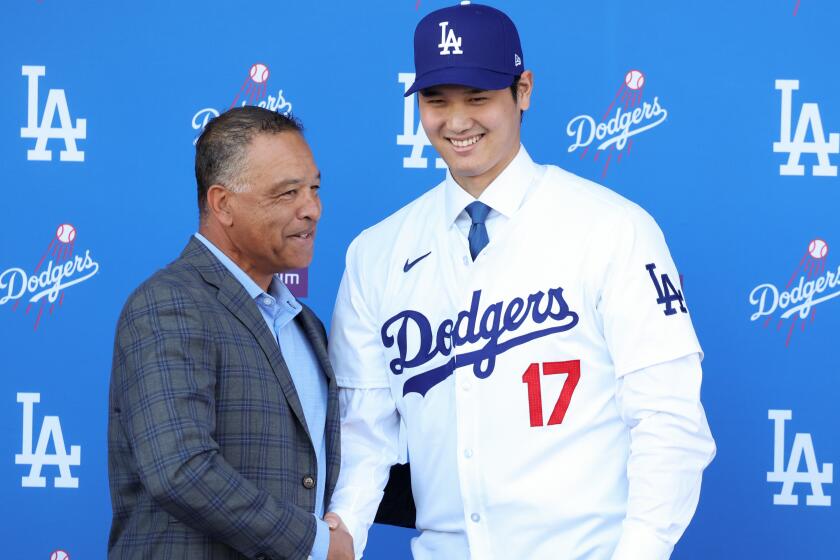Colletti is writing a different story
There is new spring in Ned Colletti’s step these days, a brighter glint in his eye.
Both are traceable to the same thing: Frank McCourt is no longer even a distant speck in the Dodgers’ rearview mirror.
Colletti, Dodgers general manager since 2005, isn’t saying that. We are. Colletti is too classy to throw somebody under the bus who gave him his dream job.
“I will always be proud to be part of this organization,” Colletti says.
In a lengthy interview with Colletti on Saturday, the name McCourt was mentioned sparingly, usually by the interviewer. McCourt is useful now only as perspective. The Dodgers, Los Angeles and Colletti have been there, done that. Colletti eases out the past by celebrating the present.
“Now, in the last 10 months, it feels real,” Colletti says. “These people [new ownership] see a toothpick and think about a redwood tree.”
Colletti, 58, is in the driver’s seat, which is fascinating because he is a rags-to-riches story. Even the cash-spigot Guggenheim people, who wisely kept Colletti on the job after buying out McCourt, probably have not pondered the roots of the man to whom they have handed the keys.
He was born and raised in Chicago, on the wrong side of the tracks. Colletti’s family couldn’t even see the tracks.
His first six years of life, he lived in a house that was a converted garage. Eventually, the family bought a house in suburban Franklin Park.
“The southeast corner of O’Hare Airport,” Colletti says. “Mostly industrial. The house was 800 square feet, the mortgage $70 a month, and it was tough making it.”
His father was a hourly wage mechanic who fixed machinery.
“Any chance for an hour of overtime,” Colletti says, “he took it.”
Wednesday was the toughest day of the week.
“We were always out of money by then,” Colletti says. “I’d go to the local deli, Al & Joe’s. They’d have index cards with names of each family. I’d get some meat, the guy wrote it down on the card and then Friday, payday, we’d go to the bank, get the money and pay up.”
Colletti went to Northern Illinois University about the same time as the guy who types on page 2 of this sports section. Colletti graduated.
By the early 1980s, Colletti had wandered into the upwardly immobile field of sportswriting, and was a hockey writer for the Philadelphia Journal when it folded. He had gotten a taste of the business out of college, as a high school writer during the golden age of Chicago sportswriting, the days of John Schulian, Ron Rapoport, David Israel, Mike Downey, Ray Sons and Randy Harvey, to name just a few.
After Philadelphia, he tried to stay in the game, applying but failing to make the cut at several newspapers. That included the Milwaukee Journal, where the then-child sports editor (now typing this column) decided a hockey writer was a bad fit for a city that never warmed to hockey.
“My son was just born,” Colletti says. “The interest rates were 18% and my dad, still in Chicago, was 49 and had lung cancer. And my mom had never even driven a car.”
Going home became the only choice.
He took a $14,000-a-year job in publications for the Cubs, worked long hours as his dad taught him, and was at his desk one night around 7 when Cubs General Manager Dallas Green walked past, introduced him to a team lawyer and assigned him to work with the lawyer on salary arbitration. Suddenly, the sportswriter wannabe was in the pipeline to baseball management. That eventually led to his becoming the Giants’ GM and, in November 2005, to a job with the Dodgers.
“I’m still not sure if this would have happened,” Colletti says, “had I not been working late that night.”
His dad died at age 51. His mom learned to drive, got a job in a college bookstore, and now, at 83, is being moved to a care facility.
“Seconds after we lost in the NLCS in both ’08 and ‘09,” Colletti says, “my phone rang and it was my mom, telling me she was proud and it would be OK. The next day, she didn’t remember making the call.”
The Dodgers’ season of great expectations is upon us. There is no ceiling on product or price. And the steward of all this embraces it with better perspective than any of us might, or could.
“I am blessed to be where I am,” Colletti says, “blessed because of my life, where I learned that nothing is handed to you, nothing is easy.”
Ah, but the disappearance of that speck in the rearview mirror sure helps.
--
More to Read
Are you a true-blue fan?
Get our Dodgers Dugout newsletter for insights, news and much more.
You may occasionally receive promotional content from the Los Angeles Times.







